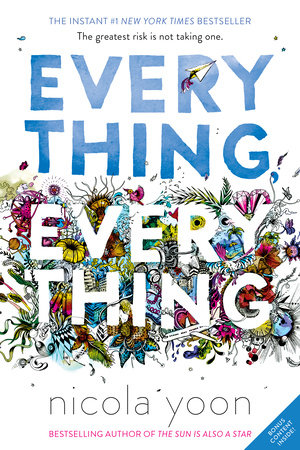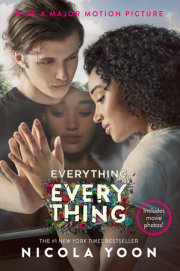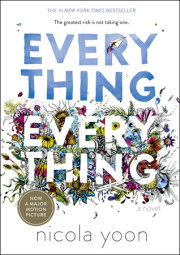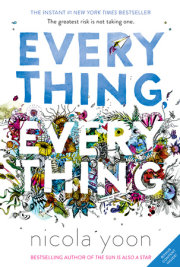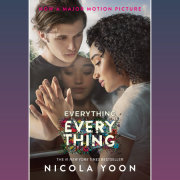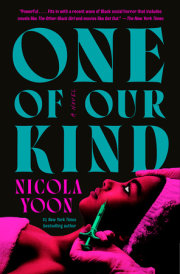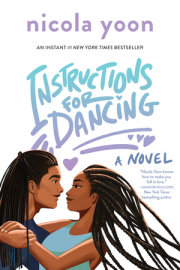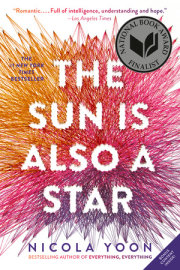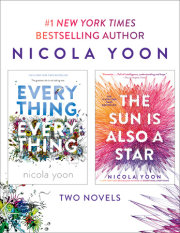BRTHDAE UISH
“MOVIE NIGHT OR Honor Pictionary or Book Club?” my mom asks while inflating a blood pressure cuff around my arm. She doesn’t mention her favorite of all our post-dinner activities—Phonetic Scrabble. I look up to see that her eyes are already laughing at me.
“Phonetic,” I say.
She stops inflating the cuff. Ordinarily Carla, my full-time nurse, would be taking my blood pressure and filling out my daily health log, but my mom’s given her the day off. It’s my birthday and we always spend the day together, just the two of us.
She puts on her stethoscope so that she can listen to my heartbeat. Her smile fades and is replaced by her more serious doctor’s face. This is the face her patients most often see— slightly distant, professional, and concerned. I wonder if they find it comforting.
Impulsively I give her a quick kiss on the forehead to remind her that it’s just me, her favorite patient, her daughter.
She opens her eyes, smiles, and caresses my cheek. I guess if you’re going to be born with an illness that requires constant care, then it’s good to have your mom as your doctor.
A few seconds later she gives me her best I’m-the-doctor- and-I’m-afraid-I-have-some-bad-news-for-you face. “It’s your big day. Why don’t we play something you have an actual chance of winning? Honor Pictionary?”
Since regular Pictionary can’t really be played with two people, we invented Honor Pictionary. One person draws and the other person is on her honor to make her best guess. If you guess correctly, the other person scores.
I narrow my eyes at her. “We’re playing Phonetic, and I’m winning this time,” I say confidently, though I have no chance of winning. In all our years of playing Phonetic Scrabble, or Fonetik Skrabbl, I’ve never beaten her at it. The last time we played I came close. But then she devastated me on the final word, playing JEENZ on a triple word score.
“OK.” She shakes her head with mock pity. “Anything you want.” She closes her laughing eyes to listen to the stethoscope.
We spend the rest of the morning baking my traditional birthday cake of vanilla sponge with vanilla cream frosting. After it’s cooled, I apply an unreasonably thin layer of frosting, just enough to cover the cake. We are, both of us, cake people, not frosting people. For decoration, I draw eighteen frosted daisies with white petals and a white center across the top. On the sides I fashion draped white curtains.
“Perfect.” My mom peers over my shoulders as I finish up. “Just like you.”
I turn to face her. She’s smiling a wide, proud smile at me, but her eyes are bright with tears.
“You. Are. Tragic,” I say, and squirt a dollop of frosting on her nose, which only makes her laugh and cry some more. Really, she’s not usually this emotional, but something about my birthday always makes her both weepy and joyful at the same time. And if she’s weepy and joyful, then I’m weepy and joyful, too.
“I know,” she says, throwing her hands helplessly up in the air. “I’m totally pathetic.” She pulls me into a hug and squeezes. Frosting gets into my hair.
My birthday is the one day of the year that we’re both most acutely aware of my illness. It’s the acknowledging of the passage of time that does it. Another whole year of being sick, no hope for a cure on the horizon. Another year of missing all the normal teenagery things—learner’s permit, first kiss, prom, first heartbreak, first fender bender. Another year of my mom doing nothing but working and taking care of me. Every other day these omissions are easy—easier, at least—to ignore.
This year is a little harder than the previous. Maybe it’s because I’m eighteen now. Technically, I’m an adult. I should be leaving home, going off to college. My mom should be dreading empty-nest syndrome. But because of SCID, I’m not going anywhere.
Later, after dinner, she gives me a beautiful set of watercolor pencils that had been on my wish list for months. We go into the living room and sit cross-legged in front of the coffee table. This is also part of our birthday ritual: She lights a single candle in the center of the cake. I close my eyes and make a wish. I blow the candle out.
“What did you wish for?” she asks as soon as I open my eyes.
Really there’s only one thing to wish for—a magical cure that will allow me to run free outside like a wild animal. But I never make that wish because it’s impossible. It’s like wishing that mermaids and dragons and unicorns were real. Instead I wish for something more likely than a cure. Something less likely to make us both sad.
“World peace,” I say.
Three slices of cake later, we begin a game of Fonetik. I do not win. I don’t even come close.
She uses all seven letters and puts down POKALIP next to an
S. POKALIPS.
“What’s that?” I ask.
“Apocalypse,” she says, eyes dancing.
“No, Mom. No way. I can’t give that to you.”
“Yes,” is all she says.
“Mom, you need an extra
A. No way.”
“Pokalips,” she says for effect, gesturing at the letters. “It totally works.”
I shake my head.
“P O K A L I P S,” she insists, slowly dragging out the word.
“Oh my God, you’re relentless,” I say, throwing my hands up. “OK, OK, I’ll allow it.”
“Yesssss.” She pumps her fist and laughs at me and marks down her now-insurmountable score. “You’ve never really understood this game,” she says. “It’s a game of persuasion.”
I slice myself another piece of cake. “That was not persuasion,” I say. “That was cheating.”
“Same same,” she says, and we both laugh.
“You can beat me at Honor Pictionary tomorrow,” she says.
After I lose, we go to the couch and watch our favorite movie,
Young Frankenstein. Watching it is also part of our birthday ritual. I put my head in her lap, and she strokes my hair, and we laugh at the same jokes in the same way that we’ve been laughing at them for years. All in all, not a bad way to spend your eighteenth birthday.
Copyright © 2015 by Nicola Yoon. All rights reserved. No part of this excerpt may be reproduced or reprinted without permission in writing from the publisher.

